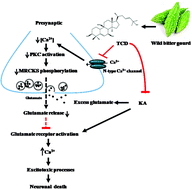TCD, a triterpenoid isolated from wild bitter gourd, reduces synaptosomal release of glutamate and protects against kainic acid-induced neuronal death
Abstract
3β,7β,25-Trihydroxycucurbita-5,23(E)-dien-19-al (TCD) is a triterpenoid isolated from wild bitter gourd that is a common tropical vegetable with neuroprotective effects. Because excessive glutamate release is a major cause of neuronal damage in various neurological disorders, the aims of this study were to examine the effect of TCD on glutamate release in vitro and to examine the effect of TCD in vivo. In rat cerebrocortical synaptosomes, TCD reduced 4-aminopyridine (4-AP)-stimulated glutamate release and Ca2+ concentration elevation, but had no effect on plasma membrane potential. TCD-mediated inhibition of 4-AP-induced glutamate release was dependent on the presence of extracellular calcium; persisted in the presence of the glutamate transporter inhibitor DL-TBOA, P/Q-type Ca2+ channel blocker ω-agatoxin IVA, and intracellular Ca2+-releasing inhibitors dantrolene and CGP37157; and was blocked by the vesicular transporter inhibitor bafilomycin A1 and the N-type Ca2+ channel blocker ω-conotoxin GVIA. Molecular docking studies have demonstrated that TCD binds to N-type Ca2+ channels. TCD-mediated inhibition of 4-AP-induced glutamate release was abolished by the Ca2+-dependent protein kinase C (PKC) inhibitor Go6976, but was unaffected by the Ca2+-independent PKC inhibitor rottlerin. Furthermore, TCD considerably reduced the phosphorylation of PKC, PKCα, and myristoylated alanine-rich C kinase substrate, a major presynaptic substrate for PKC. In a rat model of kainic acid (KA)-induced excitotoxicity, TCD pretreatment substantially attenuated KA-induced neuronal death in the CA3 hippocampal region. These results suggest that TCD inhibits synaptosomal glutamate release by suppressing N-type Ca2+ channels and PKC activity and exerts protective effects against KA-induced excitotoxicity in vivo.



 Please wait while we load your content...
Please wait while we load your content...